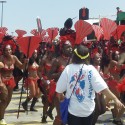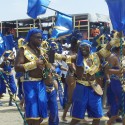Q & A with Author Althea Prince
 Interviewed by Adebe DeRango-Adem
Interviewed by Adebe DeRango-Adem
When did you first discover the power of words? Did you write as a child?
I loved the power of words that flowed to me in the storytelling that I heard as a child. I loved books, and read voraciously. I also started writing as a child; I remember being around eleven years old, when I began writing fairytales.
What initially prompted you to write The Politics of Black Women’s Hair (Insomniac Press, 2010)?
I noticed that women of African descent had returned to straightening their hair—something that had been lessened in the sixties and seventies. In addition, the penchant for weaves seemed widespread, even among very young women. I wondered what this meant to little Black girls’ self-esteem; and also what mothers of Black girls were communicating to their daughters about their natural hair. The book thus focuses on my own “hair” experiences, as well as what several mothers of Black girls had to say about their parenting surrounding their daughters’ hair.
Though a political statement, hair is often relegated to the realm of pop culture, beauty, i.e. superficial subjects. What do you think has muted the politicization of hair, particularly for Black communities, until recently?
Understandably, the rhetoric of the politics of the sixties and seventies that determined that natural hair was the way to go no longer seems to hold sway for many young Black women. Thus, without the overt language, sentiment, and action of the Black Cultural Revolution that ensued during those years, I think that Black women make choices about their hair from a place that is, more often than not, outside of the political arena. Rather, these choices seem to come from a place of monoracial beauty standards, and from the desire to fit into the cultural hegemony of mainstream society.
How has the experience of moving from the Caribbean to Canada factored into your work? Do you see Black Canadian writers who identify with a Diaspora as more apt to use their craft to cross multiple barriers aesthetically or culturally?
I moved to Canada in 1965; thus, my sensibilities were shaped by the Caribbean, and my adulthood was nurtured in Canada. My fiction writing is reflective of both lived experiences. I think all artists create from within their aesthetic and/or cultural identity. However, I can only speak of my own journey as a writer in this regard. I identify as a Caribbean Diaspora, and with an African Canadian cultural aesthetic. I do not see my writing as dealing with or crossing barriers. Rather, I write from where I am located culturally and politically.
Do you think that part of the role of the writer is to remember or collect history?
I have a very clear understanding that I write about what interests me. I write about whatever happens to be my focus, obsession, and preoccupation. I write for no one, not even myself. I allow the story, or essay to “arrive,” and recognise that I am an instrument for allowing the piece to take shape, rather than contriving a topic or focus that is not interesting to me. My freedom to focus on whatever is of interest to me supersedes any role that might be attributed to writers from outside of their creative vision.
You are a professor at Ryerson University. In honour of this special Black History interview series for Open Book, how do you see the role of creative writing within the larger project of recognizing, preserving and promoting the contributions of Black peoples and their collective histories?
I think that creative writers, like other artists, must stay in integrity with themselves regarding what they write, and how they write it. I see myself as someone who writes, and if what I write is useful in the “larger project” of recognizing, preserving, and promoting the contributions of Black people and their collective histories, then that is a bonus. It is not, however, a part of the catalyst for my writing. Thus, I allow myself to be free of all gatekeepers, including buying into a prescribed role as a writer. I do not write because I have a political mission. I write because I must.
What are you reading right now, or planning to read in the near future?
Itah Sadu’s recent children’s book, Mathieu Da Costa: First to Arrive. I have been reading this children’s book again and again. I am pleased with the fact that, as African Canadian people, we are able to carry out historical “digs” to retrieve the knowledge of Africans in Canada, dating back to 1603. The book pleases me in its clarity, simplicity. I am also enjoying the CD that accompanies it, on which the author sings a calypso about Mathieu Da Costa. Good stuff!
What books would be on your quintessential Black History reading list, for readers seeking to widen their understanding of the Black literary tradition?
Aimé Césaire Notebook of a Return To My Native Land
Frantz Fanon: The Wretched of The Earth
C.L.R. James: Beyond A Boundary
Mary Prince: The History of Mary Prince: A West Indian Slave (edited by Moira Ferguson)
What are some memorable Black-authored books that have a special place in your shelves?
George Elliott Clarke: Execution Poems
Jamaica Kincaid: Annie John
Paule Marshall: Praisesong For The Widow
Alice Walker: Meridian
What advice would you have to writers who want to get their voice heard, and are just starting out?
Focus on your writing, not on the gate-keepers…a clichéd term, yet one that is still operable.
What author in history would you have loved to have a coffee (or tea) and chat with, and why?
I say, unpretentiously, that wherever I could sit down for a beer with Bert Williams (Egbert Austin Williams. Born 1875 in Swetes Village, Antigua…died 1922) would be transformed into an Antiguan equivalent of ‘The Left Bank’. His role in the transformation of the stage for African Americans is well known – so too is his famous song, “Nobody”. What is not known, however, is how he thought his Antiguan origins impacted on his work in terms of politics, language, idiom, imagery, and music.
Are you currently at work with any new projects? Where can we go to hear or find your work?
I have just completed a new essay collection that I will be submitting shortly for consideration, entitled Race is the White Elephant in the Room…And Other Essays in the Key of Black Life. I am also working on a book on the fetishization of Black women’s bodies. While publication dates are not yet known, my website will carry announcements about these and other publications in a timely manner.
About the Author
Dr. Althea Prince is an award-winning author of such books as Loving This Man and Ladies of the Night: A Short Story Collection. Born in Antigua, she now lives in Toronto where she teaches at Ryerson University. She also continues to provide writing workshops for a multitude of clients, including Yorkwoods Library, A Different Booklist, Griot Productions and The Toronto Writing Centre. Dr. Prince is the recipient of various awards, including the 2010 “Outstanding Person of the Year” award from The Antigua Girls’ High School Alumni Association of North America and the 2007 Antigua and Barbuda International Writers’ Festival First Annual Award for Literary Excellence. Visit her website at www.altheaprince.com.







Leave your response!